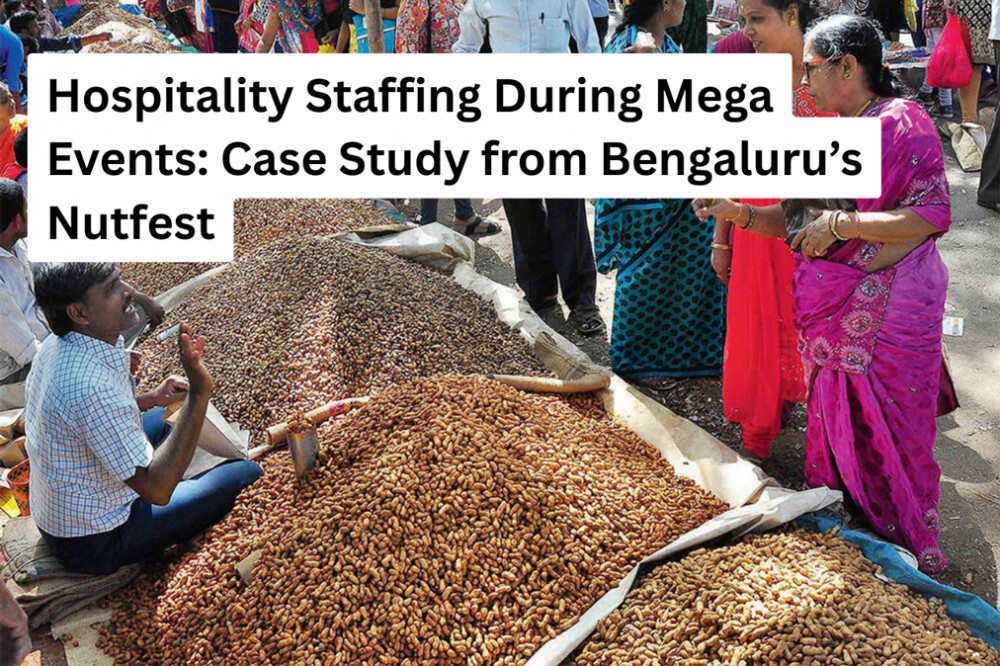
Micro-Hospitality Careers: How 2025 Belongs to the 2-Hour Hotel Job

In 2025, the hospitality industry bears little resemblance to what it looked like even ten years ago. Rigid shifts, long shifts, and long careers in the hotel sector are a thing of the past. Flexible work is now the new norm, with new layers of work emerging in hospitality, including gig jobs, micro careers, and temporary jobs in food and beverage. Instead, we are creating a new employment MODEL where a 2-hour role in the hotel sector can be as useful and fulfilling as a full-time job.
The Move to Gig Jobs in Hospitality
Around the world, the gig economy has changed the way people think about work – and in India, this is entrenched in hospitality. Whether it's drivers or freelance designers, people want jobs that fit into their lives rather than jobs that drive their lives. Hotels and restaurants are shifting to gig jobs in hospitality, to respond to erratic demand and seasonal spikes, and because workers are increasingly specialised to provide guest services.
It is now easier for hotels and restaurants to hire temporary skilled workers to perform a shift of work than employ large permanent workforces. For example, an employee may be employed as a Barista for just two hours during the morning rush or a banquet helper can be hired for one event only during the wedding season. The shift to gig economy work increases efficiency, lowers costs and raises autonomy for workers.
What are Micro-Hospitality Careers?
Micro-hospitality jobs are short-term shifts that often only take a couple of hours or a single event. Micro-hospitality careers are not the same as part-time work; they are even more flexible and can vary in hours from two to five hours. For example:
- 2-hour hotel barista jobs for breakfast service.
- Concierge support for peak check-in times.
- Banquet help on demand for an evening event or conference.
- Timely temp jobs in food and beverage - bartenders for cocktail hours.
- Event-based cleaning staff for days when occupancy spikes.
Micro-hospitality jobs incorporate the standards of hospitality service into a flexible workplace that provides both the hotel and its employees benefits of flexibility.
Why is 2025 The Year Of The 2-Hour Hotel Job?
There are a number of reasons why the growth of 2-hour hotel jobs is increasing in India and internationally.
- Flexibility In A Worker's Lifestyle
Younger people no longer want jobs where they are tied to a fixed 9-to-5 routine. Their priorities have shifted, and short shifts allow for studies or freelance work or personal interests while still being able to earn an income.
- Hospitality's Irregular Demand
Hotels are busy at irregular times. Force close-outs at check-in, festivals, long weekends, events and suddenly, you have new guests to contend with. Instead of overworking your existing team, consider a micro-hospitality career.
- Technology-Facilitated Staffing Applications
Hotel operations have evolved. Now hotel managers use applications to connect workers with shift opportunities. A hotel manager can pay an available barista for just two hours every morning. This resembles the models of ride-hailing applications.
- Generations Y and Z
These generations enjoy flexibility and variety in their careers. The short, two-hour concierge position in the morning, followed by their freelance digital work in the afternoon, aligns perfectly with that lifestyle.
- Reducing Hotel Operating Budget
A hotel does not need to hire a full-time bartender every day for short periods of time. Hotels can reduce their operating budget by hiring short-term staff for specific high-demand times.
Micro-Hospitality Examples
Flexible hotel jobs happening in India creatively include:
- Breakfast Barista Positions: Hotel cafés in city hotels will hire baristas for breakfast only.
- Wedding Season Help: Instead of hiring a large permanent banquet team, hotels are hiring event service helpers on an as-needed basis, so they are paying for service during the event.
- Concierge Staff at Peak Times: Hotels sometimes need temporary concierge help for a few hours when large groups arrive for conference bookings.
- Bartenders for Events: Resorts and banquet locations are hiring bartenders for cocktail hours only, thus creating savings for unnecessary payroll costs.
These examples show that temp jobs in food and beverage and other micro-hospitality careers are no longer the exception; they're becoming the norm.
Benefits for Workers
The growth of gig employment in the hospitality sector may provide significant benefits for job seekers, including:
- Flexibility: You can decide both when and where to work.
- Skills: Experience gained from working in a variety of roles helps you establish a broad skill set.
- Networking: Each short gig opens new doors for connections within the hospitality industry.
- Accessibility: With a lower bar for entry, most jobs require very little training; therefore, many gig jobs are open to students and other new workers.
For workers who prefer shorter commitments over longer contracts, these jobs provide opportunity without sacrificing financial gain.
Advantages for Hotels
The micro-hospitality model enables the following benefits:
- Flexibility in Staffing: Staffing levels can be adjusted in real time to respond to actual guest demand.
- Access to Specialised Talent: Hotels can use temporary staff to fill specialised roles and get trained staff without any long-term commitments.
- Employee Wellbeing: Permanent staff experience less burnout and stress when the peak rush time is handled by part-time workers.
- A Decrease in Staffing Costs: Scheduling properly depends on actual guest demand and can save money on payroll.
With the savings, flexibility, and improved guest service, flexible hotel jobs in India will be a viable option.
Challenges in Micro-Hospitality Careers
Despite its potential, the model has several challenges:
- Service Consistency: It's imperative to have an organisation training robust enough to ensure gig staff can meet brand standards.
- Worker Security: Gig jobs offer flexibility but no security or benefits (like health care and longer-term employment).
- Coordination: Most organisations have a management nightmare of overseeing multiple short-term employees who contribute to undefined schedules, limiting a constant brand standard.https://play.google.com/store/apps/details?id=connect.foodism.xyz
- Legal & Policy Issues: India's gig work regulatory framework remains a work in progress. Worker rights, minimum wage, and protection arrangements need better clarity.
The Future of Flexible Hotel Work in India
By 2030, analysts say temp work in food and beverage and other micro-hospitality jobs will account for nearly 40% of India's hotel workforce. This transition is not merely a trend; it is a shift in the employment model.
Academic institutions are adapting to this strategy as well by providing micro-certifications, short training programs targeting job-specific roles. For example, one could be eligible for weddings and event work with a 15-hour course in banquet service, and access to barista shifts in different hotels with a coffee course.
A Reformed Career Journey
A 2-hour hotel job is no longer a side gig; it has become its own career. For the worker, the micro-hospitality job is about flexibility, freedom, and learning. For a hotel, micro-hospitality offers efficiency, lower supply costs, and better service delivery. And this is why the gig model is here to stay.
As gig jobs in hospitality, flexible hotel jobs in India, and temp roles in food and beverage are even more widely accepted, hospitality careers are being reformed. We will no longer see success as identified by years of tenure, but as value delivery - whether in 2 hours. 2025 belongs to the micro-hospitality career, and the 2-hour hotel job is the symbol of change.
Stay connected with Foodism Connect for more such exciting insights!!
Related Blogs

The Rise of Boutique Hotels: Recruiting for Experience, Not Size
74 Views

Top 5 Hospitality Roles Most in Demand This Quarter
72 Views

Hospitality Staffing During Mega Events: Case Study from Bengaluru’s Nutfest
87 Views

Festival Hospitality: What Food Events Teach About Guest Management & Staffing
194 Views

Little Guests, Big Smiles: How Hotels Design Family-Friendly Experiences
172 Views